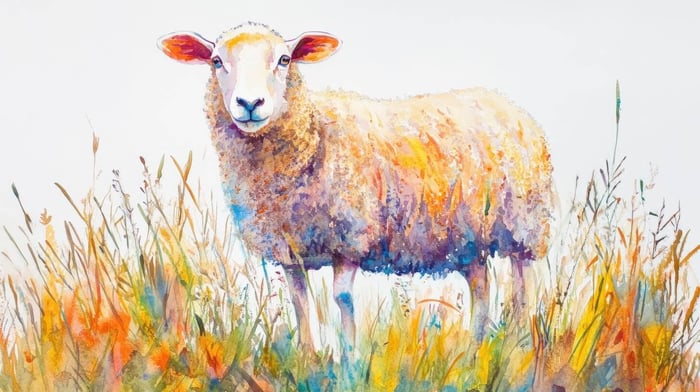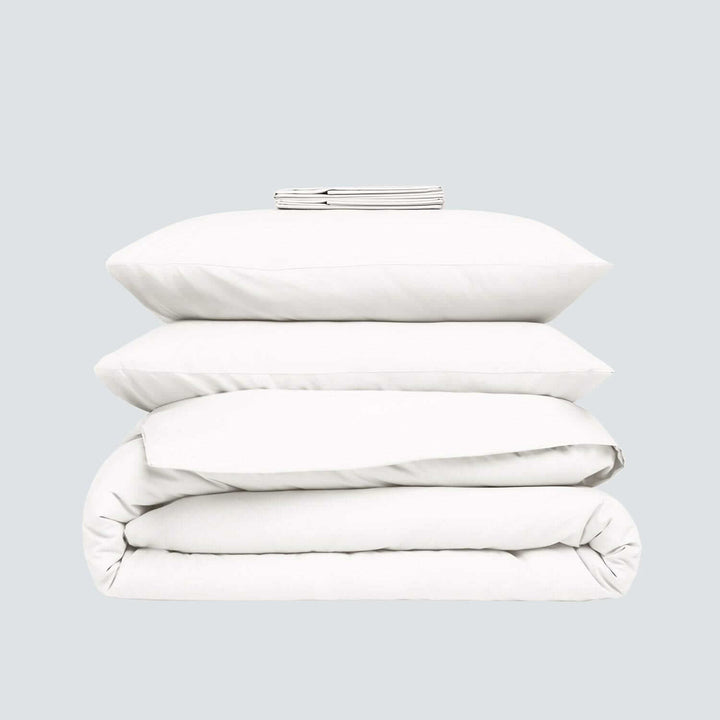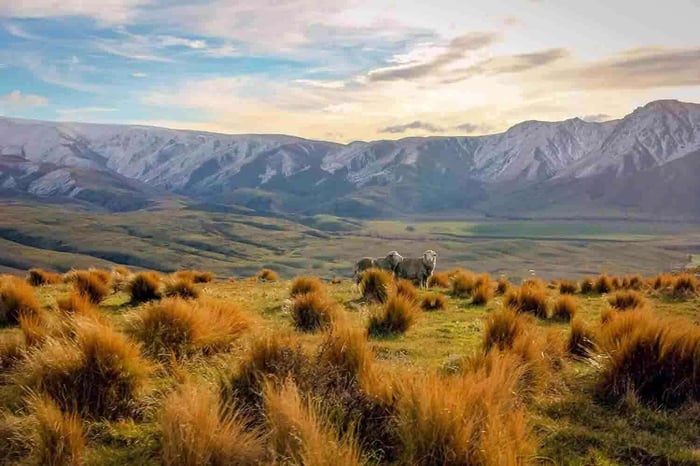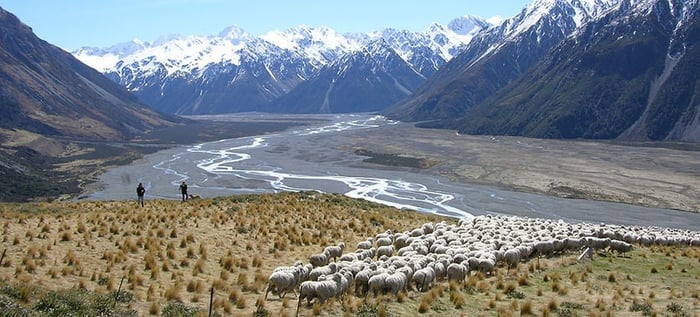Table of Contents
- We soil breathes, so do we.
- Why Is Regenerative Farming Important to Us?
- What Is Regenerative Farming?
- Why Regenerative Farming is Healthier for You
- Why Regenerative Agriculture Heals the Planet
- The Science of Regeneration
- From Soil to Sleep: The Regenerative Journey
- Our Regenerative Materials
- Regeneration in Everyday Life
- The Future Is Regenerative
- The Regenerative Sleep Difference
- FAQs on Wool Duvet Inserts, Comforters & Sustainable Bedding
We soil breathes, so do we.
Picture this: sunrise rolling over emerald hills, the air still cool, the soil alive beneath your feet. Sheep graze freely among wildflowers, enriching the land that sustains them. This is where your bedding begins — not in a factory, but in the rhythm of nature itself. That's the promise of regenerative farming.
At Antipodean Home, we don’t just make bedding. We cultivate it — from farms that heal the earth to fibers that breathe life back into your sleep. This is the story of regenerative farming and how it’s redefining what it means to rest well, live consciously, and dream in green.
 Art inspired by regenerative farming — where healthy soil, open pastures, and happy sheep begin the story of Antipodean Home’s sustainable wool bedding.
Art inspired by regenerative farming — where healthy soil, open pastures, and happy sheep begin the story of Antipodean Home’s sustainable wool bedding.Why Is Regenerative Farming Important to Us?
At Antipodean Home, we believe how we produce our bedding is just as important as how you sleep in it. Every organic wool comforter, wool duvet insert, and organic sheet set we make starts with regenerative farming — an approach that restores the land instead of taking from it. We partner with growers who see the soil as a living system, not a resource to exploit.
Keep reading to discover what regenerative agriculture is, how it creates healthier materials, and why it leads to deeper, more restorative sleep — for you and the planet.
What Is Regenerative Farming?
Regenerative farming is more than sustainability — it’s about healing the ecosystem. Instead of simply maintaining the status quo, regenerative agriculture works to rebuild what’s been lost: soil health, biodiversity, clean water, and carbon balance.
This holistic system mimics nature’s cycles to create harmony between land, animals, and people. It’s the reason our bedding feels better, lasts longer, and helps you sleep easier — because the planet that created it is thriving.
Core Practices That Regenerate the Earth
No pesticides or synthetic fertilizers — only natural soil enrichment
Crop diversity and rotation to restore soil vitality
Minimal soil disturbance with low or no-till methods
Integrating livestock to cycle nutrients naturally
Cover cropping and rotational grazing to improve water retention
Each of these practices helps create a climate-positive loop, locking carbon into the soil while producing cleaner, safer, and more resilient fibers like regenerative organic cotton and New Zealand merino wool.
Why Regenerative Farming is Healthier for You
Products from regeneratively managed farms are healthier because when soil thrives, everything that grows in it thrives too. Regenerative systems produce fibers that are naturally purer, softer, and healthier for your skin and respiratory system.
Nutrient-rich soils create stronger plant fibers and cleaner air quality.
No harmful residues — free from pesticide and chemical buildup.
Improved biodiversity supports allergen-resistant, hypoallergenic fibers.
Pasture-raised animals live in open, humane environments — resulting in wool that’s softer, longer-lasting, and temperature-regulating by design.
That’s why our organic bedding supports natural sleep — free from toxins, synthetics, and unnecessary weight. Every Antipodean comforter and duvet is a product of balance: better farming, better fiber, better rest.
Why Regenerative Agriculture Heals the Planet
Healthy soils mean a healthy planet. Regenerative farming transforms the way we produce textiles by actively restoring ecosystems rather than depleting them. Through carbon-positive farming, cover cropping, and holistic grazing, regenerative practices:
Sequester carbon in the soil, reducing greenhouse gas emissions
Minimize water waste and build drought resilience
Reduce dependence on fossil fuel fertilizers
Reclaim degraded land, encouraging biodiversity and pollinator recovery
By choosing bedding from regenerative sources, you’re helping reverse climate change one night at a time — literally sleeping in sync with nature’s rhythm.
The Science of Regeneration
Regenerative agriculture isn’t a trend — it’s science-backed restoration. Studies show that regenerative soils capture up to three times more carbon than conventionally farmed land. Each blade of grass, each root system, acts as a carbon sink, pulling greenhouse gases out of the atmosphere and storing them safely underground.
This process doesn’t just lower emissions — it builds life back into the soil, allowing diverse microbes, fungi, and insects to flourish. These micro-ecosystems create fibers that are cleaner, stronger, and more resilient — the kind of natural durability you can feel in every thread of regenerative wool bedding.
From Soil to Sleep: The Regenerative Journey
The journey from regenerative cotton farm to your organic comforter is one of respect — for the planet and for the people who tend it. Our partners manage every step intentionally:
Grazing rotations keep the pastures fertile and alive.
Water-efficient irrigation reduces waste and preserves aquifers.
Solar-powered mills spin fibers with minimal energy footprints.
The result? Bedding that embodies circular design — returning as much as it takes, and often, more. From field to fiber, to your restful night’s sleep, every stage of production closes the loop on waste and excess.
Regenerative Organic Cotton Sheet Set – Soft, Breathable & Sustainable

$189.00
Softer Sheets. Cleaner Sleep. Our organic cotton sheet set are simply better for the earth, and for your sleep. Grown on low-impact regenerative farms that actively heal the soil, our cotton is then woven and finished responsibly. This process eliminates… Read more
Our Regenerative Materials
Our bedding begins where the world breathes: on 3.7 million acres of regenerative farmland across New Zealand. These landscapes are scientifically verified as climate-positive, absorbing more carbon than they release.
We work directly with farmers who measure progress in soil health, not yield. Their flocks graze freely, their fields teem with life, and their fibers are processed gently to preserve every natural quality that makes wool and cotton extraordinary.
From regenerative wool comforters to organic cotton sheets, our materials do more than sustain — they restore and revive. The result is bedding that balances your body temperature, wicks away moisture, and helps you wake brighter.
Organic Wool Comforter

$342.00
$380.00
Our organic wool comforter is designed to keep you dry, balanced, and deeply comfortable all night. Unlike down or synthetic comforters that trap heat, our spun wool design wicks away moisture and prevents overheating, so you stay cool & dry.… Read more
Regeneration in Everyday Life
Regeneration isn’t just about farming — it’s about mindset. Choosing regenerative wool and cotton bedding means choosing to live with awareness, grounding your home in ethical comfort. It’s the difference between buying less and living better, between sustainability and revival.
Every comforter, every sheet you bring into your home carries the story of soil, water, and sky. Together, we’re proving that luxury and responsibility can coexist — that conscious comfort is not only possible, but powerful.
The Future Is Regenerative
As climate challenges grow, regenerative farming offers a blueprint for hope. Imagine 3.7 million acres of thriving pasture, where carbon is stored instead of released. Where animals live freely, and every harvest gives back more than it takes.
That’s the world Antipodean is helping build — one comforter, one restful night, one regenerative farm at a time.
The Regenerative Sleep Difference
When you slip into Antipodean bedding, you’re not just enjoying luxurious comfort — you’re taking part in a cycle that gives back more than it takes. Each thread supports a future where farms rebuild ecosystems, animals live freely, and people sleep in homes that reflect care for the earth.
It’s more than a product — it’s a promise:
Sleep regeneratively. Live restoratively. Dream in green.
Organic Wool Bedding Set

$598.40
$748.00
Cooler Nights & Deeper Sleep — Every Night Elevate your sleep with our organic wool bedding set, crafted from regenerative New Zealand wool and organic cotton for balanced, all-season comfort. These breathable, eco-friendly fibers naturally wick away heat and moisture… Read more
FAQs on Wool Duvet Inserts, Comforters & Sustainable Bedding
What makes regenerative farming different from organic farming?
While both avoid harmful chemicals, regenerative farming goes further — it restores soil health, increases biodiversity, and captures carbon. Organic farming maintains sustainable practices, but regenerative agriculture rebuilds ecosystems from the ground up.
How does regenerative agriculture improve sleep quality?
Our regenerative wool and organic cotton bedding are grown in toxin-free soils, producing cleaner, more breathable fibers. The result is natural temperature regulation, reduced allergens, and deeper, more restorative sleep — all rooted in healthy soil.
Are regenerative materials more sustainable than conventional ones?
Yes. Regenerative materials actively give back to the environment. They are sourced from climate-positive farms that absorb more carbon than they emit, making them one of the most sustainable bedding choices available today.
Why does Antipodean use wool from regenerative farms in New Zealand?
New Zealand’s regenerative farms span over 3.7 million acres of verified climate-positive land. These farms practice ethical animal care, soil enrichment, and water conservation — producing luxurious, natural wool that’s good for people and the planet.
How can I support regenerative farming through my purchases?
Choosing regenerative organic bedding is one of the simplest ways to help restore ecosystems. Every comforter and sheet set you buy supports farms that rebuild soil health, improve biodiversity, and create a regenerative future for sleep and the earth.




